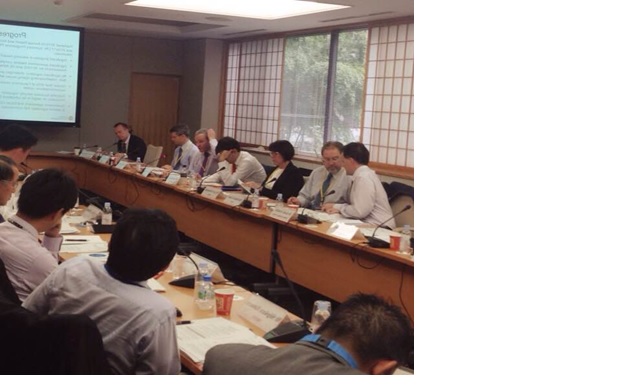16th November 2016 London, UK
Edging forward with the UK-Japan nuclear dialogue

The UK and Japan share certain characteristics. They are both proud island nations with a strong seafaring tradition. Their citizens are often considered somewhat reserved by others but are well known to enjoy the shared experience of team sports.
Importantly for us, there has been a long tradition of seeking excellence in science and technology development. Recently we celebrated the 150th anniversary of the departure of the Chōshū Five to attend University College London. Upon their return to Japan all five became national leaders including Inoue Kaoru who was Minister of Foreign Affairs from 1885 to 1887 (for more detail read UCL and Japan 150 celebration). These days there are great opportunities for UK students to make the journey to Japan and undertake internships funded, for example, by the Japanese Society for the Promotion of Science.
By 1870 British engineers were helping to build Japanese railways on Honshu, running locomotives built in the UK. Nearly 150 years later Hitachi is building locomotives in the UK, with a new manufacturing and assembly plant being constructed in Newton Aycliffe, County Durham, in support of the Department of Transport’s Intercity Express Programme and other projects in Europe.
Both Hitachi and Toshiba are key players in nuclear new build in the UK given their backing of Horizon (Hitachi) and NuGen (Toshiba) who are the developer companies. These are inevitably collaborations because, in reality, it takes many companies to build and then operate a nuclear power station – including engineering project management, architects, civil engineering as well as the manufacturing of the actual nuclear plant and conventional generating turbines. In order to develop the underpinning expertise, at the end of October Hitachi-GE Nuclear Energy, Ltd. signed a Memorandum of Understanding with Imperial College and Bangor University, to support a Boiling Water Reactor Research Hub and Network. This will build on the existing programme of Japanese internships for UK students.
For five years the UK and Japan have met for an annual nuclear dialogue, the purpose of which is “to strengthen bilateral cooperation across the full range of civil nuclear activities”. The UK and Japan have a long history and complementary expertise in nuclear energy, which makes us ideal strategic partners in this industry. I have been fortunate to chair the last four of these dialogues and have seen some remarkable developments not only in the content but also in tone. At the beginning of my tenure, discussion was dominated by the immediate post Fukushima Dai-ichi agenda: how to proceed with clean-up, a discussion of relative regulatory processes, how to develop joint Fukushima Dai-ichi related academic research projects, how to communicate to the public, and the distant prospect of new build. This time we discussed further work and support at the Dai-ichi site (especially the collaboration with Sellafield Ltd., and the UK Nuclear Decommissioning Authority); learnt about further secondments of nuclear regulators to each other’s organisations; celebrated the completion of our first joint university based projects (published work) and the next (third) round of agreed funding; learnt about the latest joint public engagement activities while starting to discuss the role of social science in public understanding; and finally, discussed progress made by Horizon and NuGen through the Generic Design Assessment process.
Despite the enormous progress in content, for me, it is also the depth to which we discuss that has changed. At the last dialogue, held in the first week of November, we debated many of the challenges that nuclear energy brings. These can be difficult conversations but the talk was frank but most constructive. The maintenance of any national infrastructure is always going to be complex and understanding the broad context is crucial. Without these five years of dialogue and trust they have engendered it would be much more of a challenge.
So, finally let me return to the theme of a shared nautical tradition; both in the UK and Japan seafaring language has seeped into everyday use. In Japanese one of these phrases is norikakatta fune (乗りかかった船) – which means, once the boat you’re on has set sail, you can’t get off until the end; in other words, we’re in this together! I think this is a good phrase for our shared nuclear work, and to use British nautical phrases, while it may not always be ‘plain sailing’ we are ‘edging forward’ and will definitely ‘fathom it out’.
Soon enough we are going to share everything from knowledge to resources! maybe is time to learn that we are on the same boat called earth!